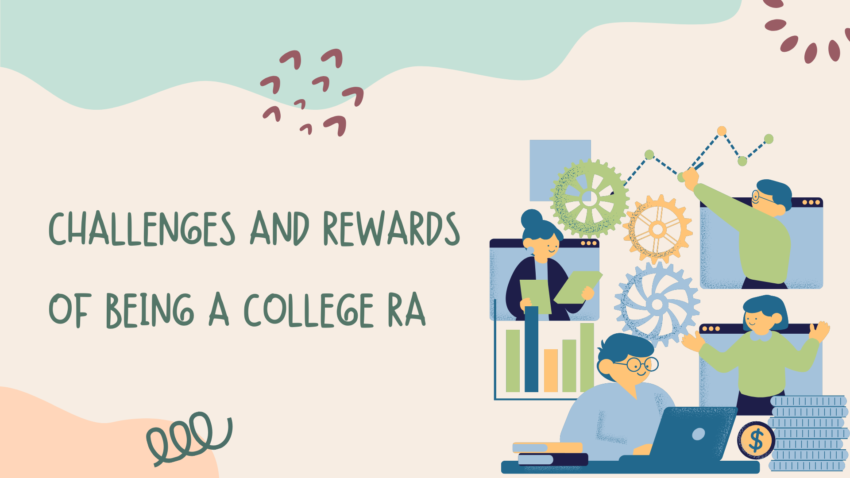Being a college Resident Assistant (RA) can be both challenging and rewarding. The role comes with a unique set of responsibilities and experiences that can shape a student’s college journey. Understanding the challenges and rewards of being a college RA is essential for anyone considering taking on this important position.
Resident Assistants – The Heart of Dorm Life
In the heart of college dorm life, Resident Assistants (RAs) stand as pillars of support and guidance for their peers. Tasked with the dual role of enforcer and encourager, RAs are the go-to for students seeking assistance with personal, academic, or housing concerns. Their role extends beyond mere rule enforcement; they are instrumental in fostering an environment conducive to growth, learning, and inclusivity.
By orchestrating events that promote community engagement, RAs help students forge connections that enrich their college experience. Equipped with a thorough understanding of campus resources, they guide residents towards the support services they need, whether it’s counseling, tutoring, or health services. Their position demands a blend of empathy, authority, and unwavering dedication to the well-being of their residents, making them indispensable to the fabric of campus life.
One of the most demanding aspects of the RA role is managing the inevitable conflicts that arise within the dormitory. From squabbles between roommates to disputes over shared spaces, RAs are often in the thick of it, tasked with defusing tensions and fostering a harmonious living environment.
Effective conflict resolution demands a high degree of empathy and patience, as well as the ability to listen actively and mediate without bias. RAs must hone their skills in understanding different perspectives and finding common ground among disputing parties. This often involves a delicate balancing act, ensuring fairness while maintaining the respect and trust of all residents involved.
Additionally, RAs must be adept at recognizing when to escalate an issue to higher authorities, a decision that requires both judgment and discretion. Successfully navigating these waters not only resolves immediate issues but also teaches invaluable lessons in diplomacy and negotiation, skills that serve well beyond the college years.
Effectively Managing Academics and RA Responsibilities
For college Resident Assistants, effectively managing the tightrope walk between academic pursuits and RA responsibilities presents a formidable challenge. These dedicated students must allocate their time wisely, often having to prioritize their duties as an RA, such as organizing events, addressing residents’ concerns, and being on-call, alongside their personal study schedules and coursework deadlines.
Mastery of time management becomes not just a skill, but a necessity, requiring RAs to plan meticulously and sometimes make difficult choices about where to focus their energies. This juggling act also demands a high level of self-discipline and the ability to set realistic goals, ensuring that neither academic nor RA duties suffer due to lack of attention.
Furthermore, RAs often develop a keen sense of prioritization, learning to discern which tasks require immediate attention and which can be scheduled for a later time. Although challenging, this intricate balancing act equips RAs with invaluable skills in time management and prioritization that are beneficial in both their academic endeavors and future professional careers.
RA’s Create Supportive Living Environments
Among the most gratifying rewards for a college Resident Assistant is the profound impact they have on creating a unified, supportive living environment. This role enables RAs to initiate a variety of community-building activities that not only bring residents closer together but also foster a sense of belonging and security within the dormitory.
Through planned social events, workshops, and informal gatherings, RAs lay the foundation for a vibrant community where every student feels valued and included. These interactions not only break down barriers and encourage inclusivity but also contribute to a richer, more engaging college experience for everyone involved. Witnessing the growth of a tightly-knit community and the positive changes in residents’ lives is immensely fulfilling.
It affirms the RA’s role as more than just a position of authority; it highlights their part in nurturing a space where students can thrive both socially and academically. Furthermore, the relationships forged in these communal settings often last well beyond the college years, providing lasting memories and connections. This aspect of the RA role underscores the importance of community and the enduring impact it has on individuals’ collegiate journey, making it a truly rewarding facet of the RA experience.
Being An RA Builds Valuable Core Competencies
The experience of being a college RA cultivates an array of valuable competencies that propel personal and professional development. Through their role, RAs refine their leadership skills by making decisions that affect their peers, navigating the challenges that come with managing a diverse group of individuals. Some of these skills include:
- Effective Communication -This position hones their ability to communicate effectively, not just in everyday interactions but also in diffusing tense situations and conveying important information clearly and persuasively.
- Conflict Resolution – This becomes a forte, as RAs frequently mediate between residents to maintain peace and harmony within the dormitory.
- Accountability and Self-Discipline – Additionally, the responsibility of being an RA instills a profound sense of accountability and self-discipline, traits highly sought after in any professional setting.
These skills, developed in the crucible of dormitory management, are directly applicable to myriad career paths, making the role of an RA not just a college job, but a foundational professional experience. As RAs navigate the complexities of their role, they emerge as more adept, versatile individuals prepared for the challenges of the workforce.
The Financial Benefits of Being a College RA
One of the tangible advantages of being a college RA includes the financial benefits and housing perks that come with the position. Many institutions offer RAs a stipend, which provides a steady income that can be used towards educational expenses, personal needs, or savings. This financial compensation varies from college to college but often represents a significant form of support for students who might otherwise struggle to manage the costs associated with higher education.
Additionally, RAs typically benefit from reduced or even fully covered housing costs. Living expenses, especially on campus, can constitute a major part of a student’s budget, and this alleviation can make a substantial difference in a student’s financial situation. These perks not only ease the financial burden of college but also allow RAs to live in close proximity to the residents they support, enhancing their ability to perform their duties effectively.
While these financial and housing benefits are attractive, they also serve as a recognition of the hard work and dedication RAs invest in their communities. This aspect of compensation underscores the value that institutions place on the crucial role RAs play in fostering a positive, supportive living environment for students.
Downsides to consider
The role of a college RA often leads to an experience akin to an emotional rollercoaster, where the highs of impactful community building are periodically met with lows of potential burnout. The constant availability required, coupled with the pressure to maintain a supportive and safe environment for all residents, can accumulate, leading to feelings of exhaustion and stress. Burnout emerges not just from the workload but from the emotional investment in the welfare of their residents, which can be draining.
Recognizing the early signs of burnout is crucial, including feelings of detachment, reduced performance, and a sense of overwhelm. To counteract these challenges, effective strategies include establishing a supportive network amongst fellow RAs and staff, setting clear personal boundaries to ensure time for rest and recuperation, and actively engaging in stress-relief activities. Implementing these coping mechanisms allows RAs to maintain their emotional and physical well-being, ensuring they can continue to provide the high level of support and leadership required by their role. By acknowledging and addressing the risks of burnout, RAs can strive to keep their emotional well-being in balance, allowing them to navigate their tenure with resilience and strength.
Is it really worth it?
Embarking on the role of a college RA presents a unique blend of challenges and rewards that profoundly influences a student’s time in college. It offers an unparalleled opportunity for growth, both personally and professionally, in a dynamic campus environment.
By stepping into this role, students open themselves to a multifaceted experience, rich with opportunities to develop leadership, time management, conflict resolution, and communication skills. These abilities are not only critical in navigating the complexities of college life but also invaluable as they transition into their future careers.
Moreover, the role provides a sense of community and belonging, as RAs play a pivotal part in shaping an inclusive and supportive environment for their peers. The financial and housing benefits are additional perks that underscore the value of this position. However, it’s important for RAs to remain vigilant about their well-being to prevent burnout and ensure they can perform their duties effectively.
By embracing the role with resilience, openness to learning, and a commitment to making a difference in the lives of their residents, RAs can look back on their journey with a sense of pride and accomplishment. This experience stands as a testament to their dedication and impact, leaving a lasting legacy on their personal and professional path.




